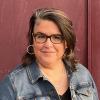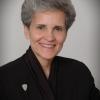Getting corporations to talk about climate change, human trafficking and social justice is what many women religious have been doing for decades. They also target their own investments into socially responsible projects that align with their missions.
Sr. Denise Boyle, FMDM, is an Irish Franciscan sister who is the Director of the Global Action Programme of Mercy International Association, in Dublin, Ireland. Prior to commencing her work with the Mercy Family in June 2013, Denise worked overseas in Australia, Zimbabwe and Geneva. Initially her ministry was as in education, till in 1992 she moved full time into education in human rights and advocacy, focussing on women and children's rights. Her work in Geneva with Franciscans International introduced her to the U.N. system, specifically the Human Rights Council and related bodies.
GSR Today - Sr. Veronika Terezia Rackova, a Slovakian nurse who has been working in South Sudan, has died. Rackova was shot May 17 in the abdomen while she was driving a patient to a hospital near Yei.
"Hands outstretched, opening to possibilities in the midst of the impossible only God can mend."
God has been pestering me lately. My heart feels restless, agitated, shaken up. Perhaps it is appropriate in this season of Pentecost. Maybe the Spirit is blasting, once again, into the locked upper rooms of my heart, rocking me out of complacency and into the urgency of mission. I don't know what God is churning up through this lovingly persistent prodding, but I sense that I must pay attention.
From A Nun's Life podcasts - In this episode of "Ask Sister," we talk about community life and how it affects your opportunities to see your families and friends and take part in life-giving relationships.
Catholic women religious working as nurses in government hospitals are a rare sight in India. An exception is Sr. Betsy Alunkal, a senior nurse in the government hospital in Palai, a predominantly Catholic town in the Kottayam district of Kerala.
Small trailers peppered the barren colonia of Penitas, Texas, when Immaculate Heart of Mary Srs. Fatima Santiago, Emily Jocson and Carolyn Kosub arrived in 2003. A recent tornado had ravaged the border town in the Rio Grande Valley, and its residents were long underserved: the town had no shops, schools or Catholic church. Neighbors were strangers, often only making contact at the single stop sign when they dropped off their kids for the school bus.
See for Yourself - "You'd take me there? You'd really take me there? Wow-ee! It's my favorite place." I glanced at the 7-year-old's mother, a long-time friend. We were sitting in her kitchen having a casual ice tea.
"The vision of the world to come seldom encourages the flourishing of the material world, but flight from it. It does not promote the splendor of the world we have, but the glory of the next."






